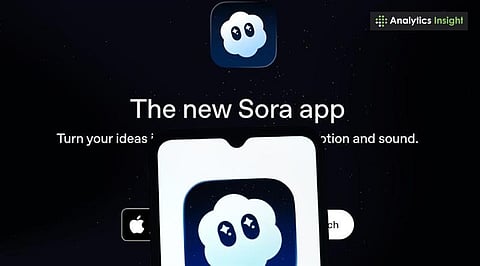

OpenAI’s new short-video app Sora 2 has become an overnight sensation, even as it faces backlash over copyright policy. The platform lets users create short clips using simple text prompts.
The instant popularity helped the model reach the top of Apple’s App Store on October 3, just three days after its launch. Sora 2 is currently available by invitation only in the United States and Canada.
Statistics from Appfigures indicate that the latest version of Sora was installed 56,000 times on opening day (September 30). Two days later, the figure rose to 1.64 lakh installs. Its swift ascent comes in the wake of success for other AI apps. ChatGPT reached the top earlier this year during the ‘Ghibli image’ trend, and Google’s Gemini was crowned following its ‘Nano Banana’ feature’s viral popularity.
The intuitive interface and the freedom provided by the app have made it a favorite among early adopters. With a few words, anyone can create realistic video moments that can then be posted in a feed familiar to TikTok or Instagram Reels. The invite-only release has also generated buzz due to the exclusive feel, fueling curiosity and demand.
Within days of its release, social media was filled with clips made by Sora of its popular Nintendo, Disney, and other big studio characters. People recreated moments like Pikachu in Saving Private Ryan or Mario in Star Wars, combining copyrighted characters with iconic movie scenes to create new, unexpected pairings. This practice has received heavy criticism for copyright infringement.
The dispute started when OpenAI announced that Sora 2 would incorporate copyrighted content unless rights holders chose to opt out. The action angered film companies and artists who claimed OpenAI was violating the long-established principle of asking permission beforehand. Disney jumped out in haste, and legal experts declared the policy morally wrong.
Some feeds were said to be stuffed full of Nintendo characters, while others went on to create parodies of them. One of these videos displayed OpenAI CEO Sam Altman shoplifting graphics cards from Target.
Facing increasing pressure from Hollywood and talent agencies, Sam Altman made a policy flip on Friday. He stated that OpenAI would now transition to an opt-in system, whereby rights holders must approve their work before it appears in Sora videos.
Altman also indicated that OpenAI would share the money with creators whose characters are licensed. “There are lots of rightsholders who view Sora as some new form of interactive fan fiction,” he blogged, “but they want to have clear decisions about how their characters look.”
Also Read: Watch Out: Sora 2 Copycat Apps Mislead Users Worldwide
Currently, Sora 2 is free, with usage limited by the computational power required for rendering videos. It differs from TikTok by imposing limits on infinite scrolling and setting higher ranks to posts from users’ own networks.
According to OpenAI, the design is meant for ‘meaningful’ engagement rather than to become addictive.
The exclusive access model has created a rush among users eager to try the app. Access codes are already being resold on eBay for Rs 850–3,750, despite OpenAI’s rules stating that such resales could lead to a ban without refund.
Despite the ongoing controversies, Sora 2’s mix of novelty, creativity, and scarcity has made it one of the most talked-about AI apps of the year.
